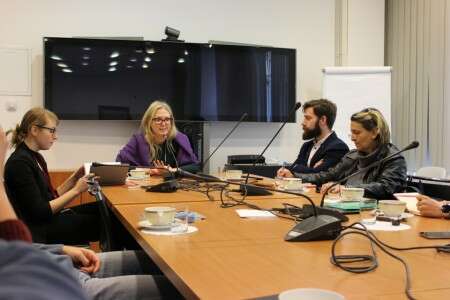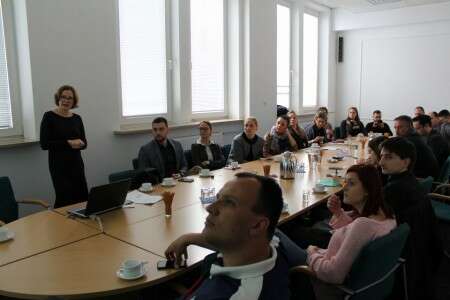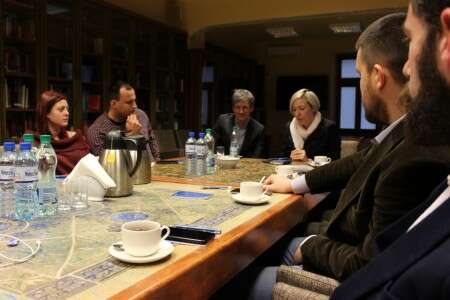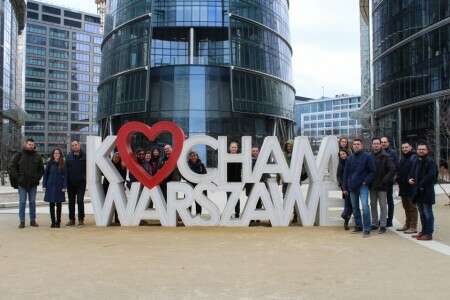Poland will celebrate 15 years this year since becoming a member state of the European Union. What is commendable is the fact that it has achieved great economic growth, improved infrastructure at the national and local level, as well as the living standard of its citizens.
The question that is inevitably raised is what was Poland's "recipe" for these successes and whether Serbia, in the process of European integration, can learn from its example.With this idea, Belgrade Open School organized a study visit to Warsaw, from 25-29 March 2019, as part of the project "Civil Society as a Force for Change in Serbia's EU Accession". With the support of the Kingdom of Sweden, this project gave the chance to representatives of 17 partner organizations on the project to discuss these mentioned topics, as well as many other, with representatives of institutions, civil society organizations and the media in Poland.
Seized development opportunities
Poland has, for the period 2014-2020, so far used over 80 billion euros from EU structural and cohesion funds. One of the project that had benefits which were clearly and quickly seen by citizens was the rapid construction of two metro lines in Warsaw. We spoke with the representative of the Ministry of Development and Investment about how Poland became a champion in the efficient use of EU funds. The reform process itself, which started even before joining the EU, i.e. during the Polish eurointegration process, lasted years and encompassed administrative reforms, incentive working conditions for quality staff in public administration, reorganization of state institutions responsible for the implementation and monitoring of European projects. Today, Poland's GDP per capita, measured by purchasing power parity, is 70% of the EU average, while before accession to the EU the number was 40%.
Two sides of the coin
In addition to the economic growth and progress which has undeniably made, by entering the EU Poland has also committed itself to nurturing what constitutes the core of European values - democracy, the rule of law, freedom and equality. However, over the past four years, Poland has become the center of attention of the European Union because of the assessment that the independence of the judiciary in that country has been jeopardized directly by passing laws that have diminished the independence of the election and work of judges in the Supreme Court. We discussed these matters of political turmoil with the Commissioner for Human Rights, Dr. Adam Bodnar, who also spoke to us about the ways in which the Commissioner's office responds to them. At the European Commission Representation in Warsaw, the group had the opportunity to hear firsthand about the Commission's activities in the Member States, and in this case also about its monitoring and reporting on the mentioned situation in Poland and the proceedings it has instituted before the European Court of Justice in relation to the violation of the rule of law and independence of the judiciary. Soon after the study visit ended, the Commission initiated another infringement procedure against Poland in order to protect judges from disciplinary action and political scrutiny.
The role of civil society and the media
Having in mind the political context, the study visit also included visits to civil society organizations and research institutions to give participants an insight into how civil society in Poland used to follow the European integration process, as well as how they function today in changed circumstances. The Helsinki Human Rights Foundation, Watchdog Poland, and the Reporters Foundation, an investigative journalist organization, presented the human rights situation in Poland, how they influence good governance and cooperate with local self-governments and the alternative ways of financing their activities in an environment where efforts for encouraging the work of civil society, freedom of the media and the security of journalists are not being made.
However, civil society will have a great influence on the next EU-Western Balkans Summit within the Berlin Process to be held in Poland, in Poznan. The group discussed the participation and contributions of civil society in organizing the Summit, cooperation with Polish institutions and the possibility of civil society participation in the Western Balkans at the Summit, with the Polish Institute for International Affairs, the Center for Eastern Studies and the Ministry of Foreign Affairs of Poland.




